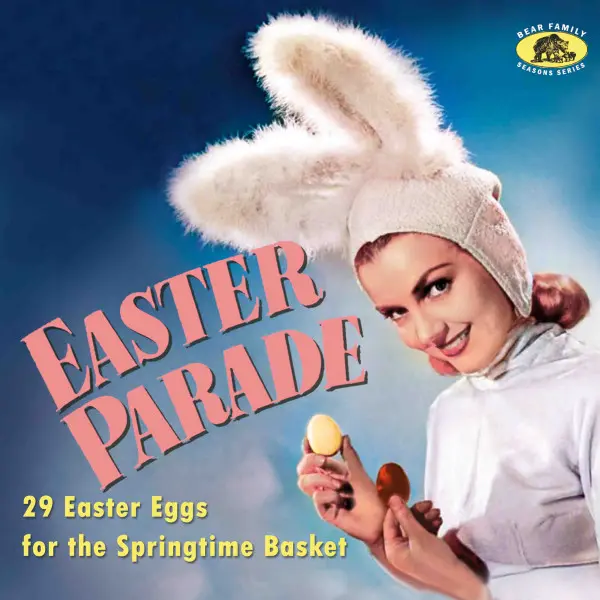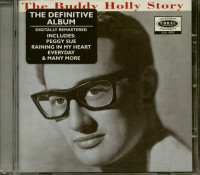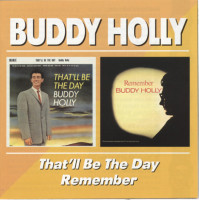Buddy Holly All Time Greatest Hits (2-CD)

- catalog number:CDMCA30101
- weight in Kg 0.2
Buddy Holly: All Time Greatest Hits (2-CD)
To achieve what Buddy Holly did in a full, unfettered lifetime career would be a stupendous achievement by any definition; to amass such an incomparable artistic legacy in a mere 18 months leaves one at a loss for superlatives. From this fleeting window on creative opportunity, Holly eked out a timeless body of work that has profoundly influenced virtually every major artist of the rock era, especially the Beatles, the Rolling Stones, Bob Dylan, Elton John, Bobby Vee, Tommy Roe, Linda Ronstadt, Elvis Costello and countless others. Fitting proof of their longevity and perennial relevance is this impressive "All Time Greatest Hits" collection which features all of the Holly tracks so widely loved the world over.
Charles Hardin Holley was born Sept. 7, 1936. His mother, who suggested he be called Buddy, was an invaluable early influence. She arranged for him to commence piano lessons when he was 11, but he moved on to guitar a year later. He formed a duo in junior high, adding a bass player and becoming a trio which opened for a local Bill Haley and the Comets concert. A Nashville agent in attendance at the gig was impressed and arranged a recording deal with Decca Records, thus opening the way for one of the fledgling 50s rock 'n' roll music industry's most intriguing tales of irony. The story surrounds the song That'll Be the Day, which had been inspired by a John Wayne quote in the film, The Searchers.
High on its hopes, Holly and his band recorded the tune on July 22, 1956.
However Decca executives didn't like the song and refused to release it. The following January, Holly's Decca contract expired and impressed by Norman Petty's production work on fellow Texan, Buddy Knox's hit recording of Party Doll - he headed down to Petty's studio in Clovis, New Mexico. On February 25, 1957, they recorded another demo of That'll Be the Day which was turned down by four record companies before an executive at Coral Brunswick Records (ironically an arm's length Decca subsidiary) recognised its potential. But because Decca legally owned That'll Be the Day by Buddy Holly, Coral released the song under the group name of the Crickets. That'll Be The Day hit number one on Sept. 23, 1957. For two years, songs were released by the Crickets on Brunswick label and by Holly on Coral -but all were recorded by Buddy Holly and his band, the Crickets.
Unquestionably these recordings provided the role model for the explosion of young and eager British rock quartets of the 60s from the Beatles on down. As one rock historian has concluded: "Buddy Holly and the Crickets were the pioneers of a new format of rock group instrumentation, using bass, drums and rhythm and lead guitars, a format that would ultimately lead to the Beatles and beyond. Above all, Buddy Holly was always separate, something supremely special and unique. He provided a uni-versal definition of living and loving in the emotional quicksand of the late 50s. Yet his legacy remains eternally relevant, and speaks to us all.
Ritchie Yorke (Rock Music Author, Historian and Broadcaster)
Track 2-14 "Early In The Morning" is incorrectly attributed to "Hickman/Jordan/Bartley" (which is a different song with this title). The writers of the Holly track are Bobby Darin and Woody Harris .
Article properties:Buddy Holly: All Time Greatest Hits (2-CD)
Interpret: Buddy Holly
Album titlle: All Time Greatest Hits (2-CD)
Label MCA
Genre Rock'n'Roll
Artikelart CD
EAN: 9399432010123
- weight in Kg 0.2
| Holly, Buddy - All Time Greatest Hits (2-CD) CD 1 | ||||
|---|---|---|---|---|
| 01 | Peggy Sue | Buddy Holly | ||
| 02 | That'll Be The Day | Buddy Holly | ||
| 03 | Rave On | Buddy Holly | ||
| 04 | Oh Boy | Buddy Holly | ||
| 05 | Brown Eyed Handsome Man | Buddy Holly | ||
| 06 | It Doesn't Matter Any More | Buddy Holly | ||
| 07 | Everyday | Buddy Holly | ||
| 08 | Well All Right | Buddy Holly | ||
| 09 | Hearbeat | Buddy Holly | ||
| 10 | Think It Over | Buddy Holly | ||
| 11 | Not Fade Away | Buddy Holly | ||
| 12 | What To Do | Buddy Holly | ||
| 13 | True Love Ways | Buddy Holly | ||
| 14 | Raining In My Heart | Buddy Holly | ||
| 15 | Reminiscing | Buddy Holly | ||
| Holly, Buddy - All Time Greatest Hits (2-CD) CD 2 | ||||
|---|---|---|---|---|
| 01 | Wishing | Buddy Holly | ||
| 02 | It's So Early | Buddy Holly | ||
| 03 | Because I Love You | Buddy Holly | ||
| 04 | Words Of Love | Buddy Holly | ||
| 05 | Listen To Me | Buddy Holly | ||
| 06 | Maybe Baby | Buddy Holly | ||
| 07 | Bo Diddley | Buddy Holly | ||
| 08 | Peggy Sue Got Married | Buddy Holly | ||
| 09 | Love's Made A Fool Of You | Buddy Holly | ||
| 10 | Slippin' & Slidin' | Buddy Holly | ||
| 11 | Fool's Paradise | Buddy Holly | ||
| 12 | I'm Gonna Love You Too | Buddy Holly | ||
| 13 | Tell Me How | Buddy Holly | ||
| 14 | Early In The Morning | Buddy Holly | ||
| 15 | Looking For Someone To Love | Buddy Holly | ||
Buddy Holly
 Singer/songwriter/guitarist born Charles Hardin Holley in Lubbock, Texas in 1936. He was one of the most innovative and influential rock'n'roll artists, and the very first professional rocker to play a Fender Stratocaster. Backed by the Crickets – Niki Sullivan (guitar), Joe B. Mauldin (double bass) and Jerry Allison (drums) – he recorded his first hit, 'That'll Be The Day', at the Norman Petty Studio in Clovis, New Mexico in 1957, following on with 'Peggy Sue', 'Oh Boy!' and others.
Singer/songwriter/guitarist born Charles Hardin Holley in Lubbock, Texas in 1936. He was one of the most innovative and influential rock'n'roll artists, and the very first professional rocker to play a Fender Stratocaster. Backed by the Crickets – Niki Sullivan (guitar), Joe B. Mauldin (double bass) and Jerry Allison (drums) – he recorded his first hit, 'That'll Be The Day', at the Norman Petty Studio in Clovis, New Mexico in 1957, following on with 'Peggy Sue', 'Oh Boy!' and others.
He had a promising career ahead of him when he was tragically killed in a plane crash on 2 February 1959 together with Ritchie Valens and the Big Bopper. He was inducted into the Rock and Roll Hall Of Fame in 1986 in the first cohort.
Buddy Holly
Buddy Holly was born on Sept. 7, 1936, in Lubbock, Texas, and christened Charles Hardin Holley. Lubbock's geo-graphical position meant that Holly would have heard hillbilly, Mexican and black music on the radio during his formative years, this cosmopolitan musical background was to prove vital to the versatility he latei displayed in his own work. As a youngster he took up the violin, but soon changed to guitar. He showed an early interest in C&W, and while still at school had his own show on KDAV, the local radio sta-tion. He was partnered by Bob Montgomery, and in 1954 they made some hillbilly demo records which were posthu-mously issued as Holly in the Hills. Together with bass-player Larry Welborn, Buddy and Bob would sometimes fill the 'local talent' spot when travelling package shows visited the area. As a result of this exposure, and with help from KDAV disc-jockey Dave Stone, Nashville agent Eddie Cran-dall and publisher Jim Denny, Buddy Holly was signed to Decca in 1956 to cut some singles in Nashville. Two were released without success, and before his contract with Decca was up Holly was beginning to look elsewhere, guessing that the option would not be renewed.
Although Decca handled Holly rather insensitively (i.e. no more nor less off-handedly than any other bright young hopeful) these early sessions did produce at least two Holly classics, 'Midnight Shift' and 'Rock Around With 011ie Vee', and Holly worked with musicians like Sonny Curtis and Jerry Allison who were later to be involved in the Crickets. The tapes were eventually issued as That'll Be The Day. Allison and Holly had been schoolfriends, and had often played together as a drum /guitar duo. The limitations of this line-up helped forge their style, the smooth switch from rhythm to lead in Buddy's guitar-playing, the versa-tility of Jerry's drumming. In 1955, when the two started playing together professionally, it was still unusual to find drums in a country line-up. Soon after his last Decca session, Holly started working at Norman Petty's studio in Clovis, New Mexico.
Petty, who was also a middle-of-the-road band leader, was a pioneer of the small, independent recording studio, he was also unusual in that he charged per song rather than per hour, which put less pressure on musicians. Holly, Allison and Welborn, to-gether with a vocal quartet which included Cricket-to-be Niki Sullivan, recorded 'That'll Be The Day' and 'I'm Look-ing For Someone To Love' in February, 1957. Petty first submitted the songs to Roulette in New York, since they had already had hits originating from his studio with Buddy Knox and Jimmy Bowen. They weren't interested, but Holly and the Crickets were soon signed by Coral. The record made No. 3 in America and No. 1 in Britain, and was fol-lowed with almost equal success by 'Oh Boy' / 'Not Fade Away'. By this time, Joe Mauldin had become the Crickets' bass-player, with Niki Sullivan on rhythm guitar. Before long Petty, who had quickly assumed a managerial position, began to record Holly solo as well as with the Crickets, though the musicians were often the same. Holly's first hit under his own name was 'Peggy Sue', late in 1957, followed in Britain by 'Listen To Me' and in both countries by 'Rave On' and the Bobby Darin number 'Early In The Morning' (by which time, mid-1958, Holly had begun to record in New York without the Crickets as well as in Clovis). After a British tour with the Crickets in that year, Holly married Maria Elena Santiago and moved to New York. The rest of the Crickets didn't want to make the move and so split from Holly. This was probably inevitable. Petty was trying to broaden Holly's career and one of the first results was to record him with the Dick Jacobs Orchestra (notably `It Doesn't Matter Anymore').
Holly's backing group on live . dates at this time included Tommy Allsup, whom he had brought into the Crickets earlier to play lead guitar (it is a mistake to assume that Holly fulfilled this role on all his records). Other notable musicians with whom Holly worked at this time were saxophonist King Curtis, and the young Waylon Jennings, whose first solo record, 'Joie Blon', was produced by Buddy Holly. Early in 1959, Holly's career was at a crossroads. In spite of the significant early impact both with the Crickets and as a solo performer, in spite of his own single-minded attitude towards success and the attempts he was making to create the basis for a long career, there was little in strict commercial terms to suggest (except with hindsight) that he was any different from many other rock performers of the time. It is, of course, inconceivable that, had he lived, he would not have risen further from the pack and still be accorded the respect that his prolific few years have so justly earned for him. He died on February 3, 1959, together with Ritchie Valens and the Big Bopper soon after taking off from Mason City airport in Iowa, en route between package-tour concerts in Clear Lake and Fargo. His current record, 'Heartbeat', was barely making an impact on the Hot Hundred. The first posthumous release, 'It Doesn't Matter Any-more' PRaining In My Heart', was a huge hit in both Ameri-ca and Britain.
And in Britain a series of processed tapes put out by Norman Petty kept him in the charts until the mid-Sixties, while an album of his best-known tracks was still in the Top Ten of the budget-price charts ten years earlier. Buddy Holly said 'We owe it all to Elvis'. Countless stars of the Sixties owe a similar debt to. Holly. He was one of the two great singer / songwriter /musicians of the pop Fifties (the other being Chuck Berry). He was a pioneer of the subse-quently-standard two guitars/ bass / drums line-up, and of double-tracking. Almost anything that a pop song can say was said by the twenty-two-year-old Buddy Holly nearly two decades ago.
Eine ganz ausgezeichnete CD-Box.
Das war eine Überraschung, dass BFR eine Doppel-CD von MCA Records aus dem Jahre 1992 augetrieben hat. Aber die ist absolut nicht "in die Jahre gekommen", ganz im Gegenteil: Es ist mit die beste Kopplung in Bezug auf die Top-Hits von Buddy Holly, die ich kenne. Ich habe diesen Kauf jedenfalls absolut nicht bereut und kann diese Option nur weiterempfehlen.

Ready to ship today, delivery time** appr. 1-3 workdays

Item has to be restocked

Item has to be restocked

Item has to be restocked

Ready to ship today, delivery time** appr. 1-3 workdays

Ready to ship today, delivery time** appr. 1-3 workdays

Ready to ship today, delivery time** appr. 1-3 workdays

This article is deleted and can no longer be ordered!

Ready to ship today, delivery time** appr. 1-3 workdays

Ready to ship today, delivery time** appr. 1-3 workdays

Ready to ship today, delivery time** appr. 1-3 workdays

Ready to ship today, delivery time** appr. 1-3 workdays

Ready to ship today, delivery time** appr. 1-3 workdays

Ready to ship today, delivery time** appr. 1-3 workdays

This article is deleted and can no longer be ordered!

Ready to ship today, delivery time** appr. 1-3 workdays

only 2x still available
Ready to ship today, delivery time** appr. 1-3 workdays

only 2x still available
Ready to ship today, delivery time** appr. 1-3 workdays

only 1x still available
Ready to ship today, delivery time** appr. 1-3 workdays

Item has to be restocked













